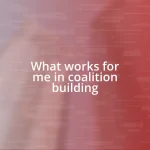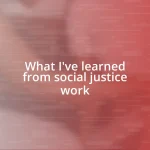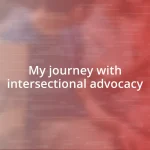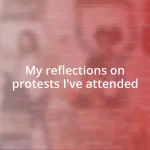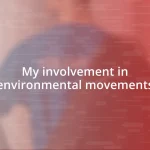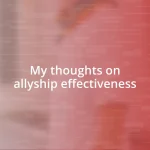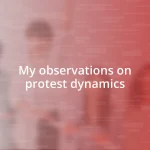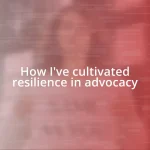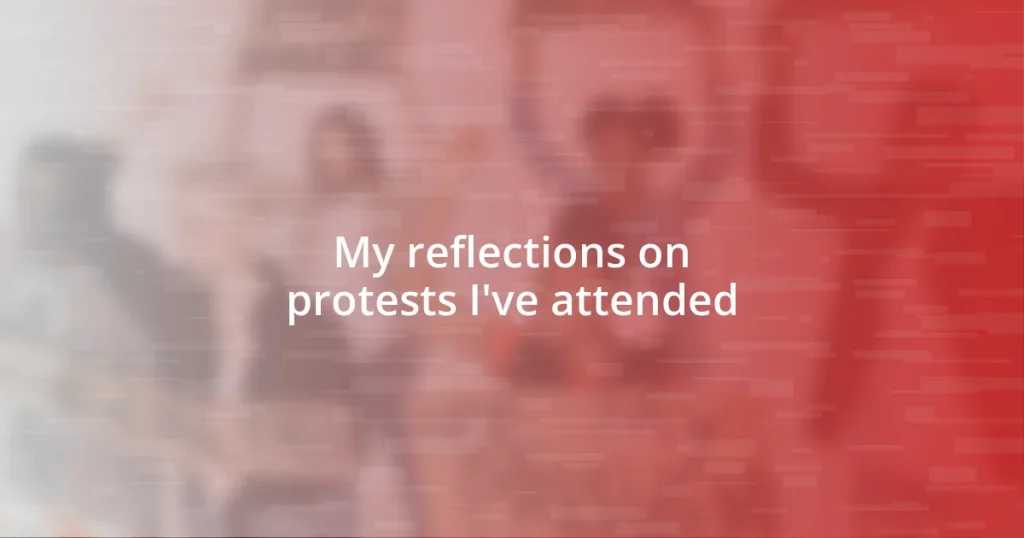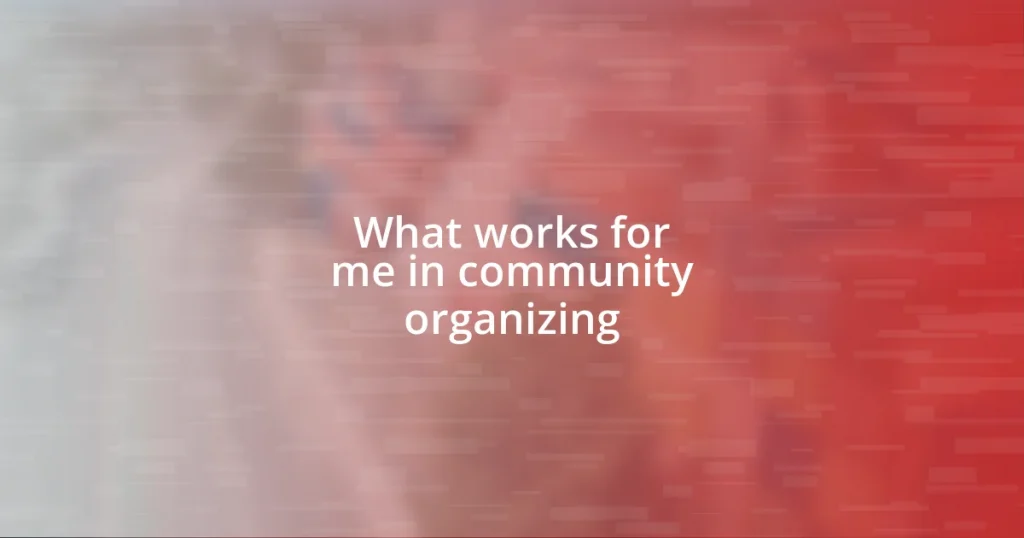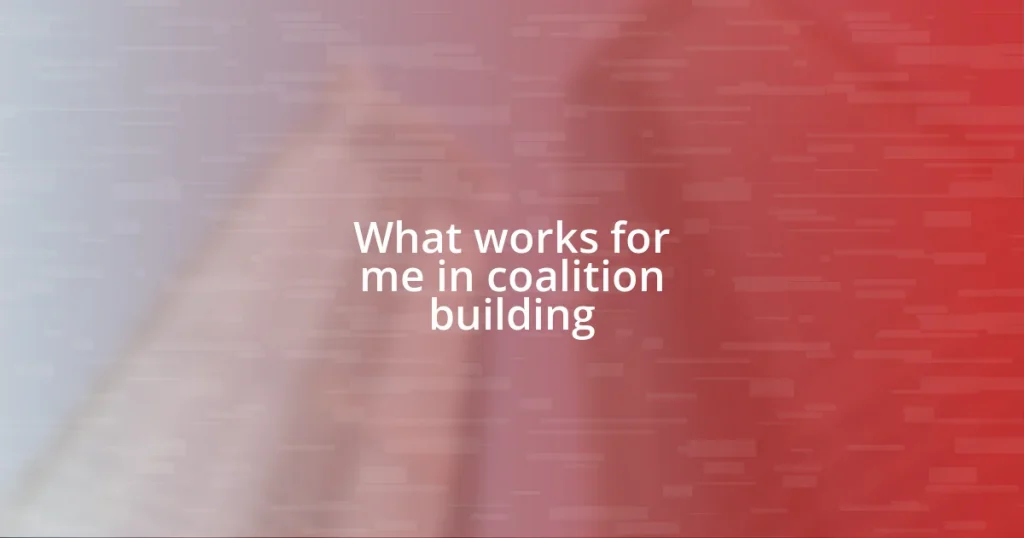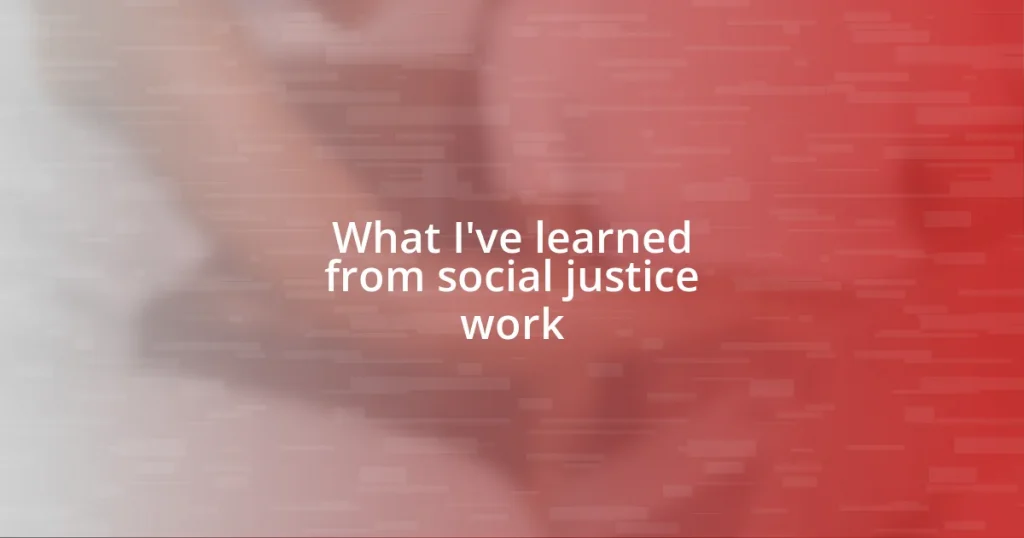Key takeaways:
- Protests foster a sense of community and shared purpose, demonstrating how collective voices can ignite change.
- Emotions experienced during protests, such as hope, anxiety, and empathy, shape participants’ perspectives and commitment to social justice.
- Preparation and self-care are crucial for effective activism, ensuring informed participation and emotional resilience after impactful events.
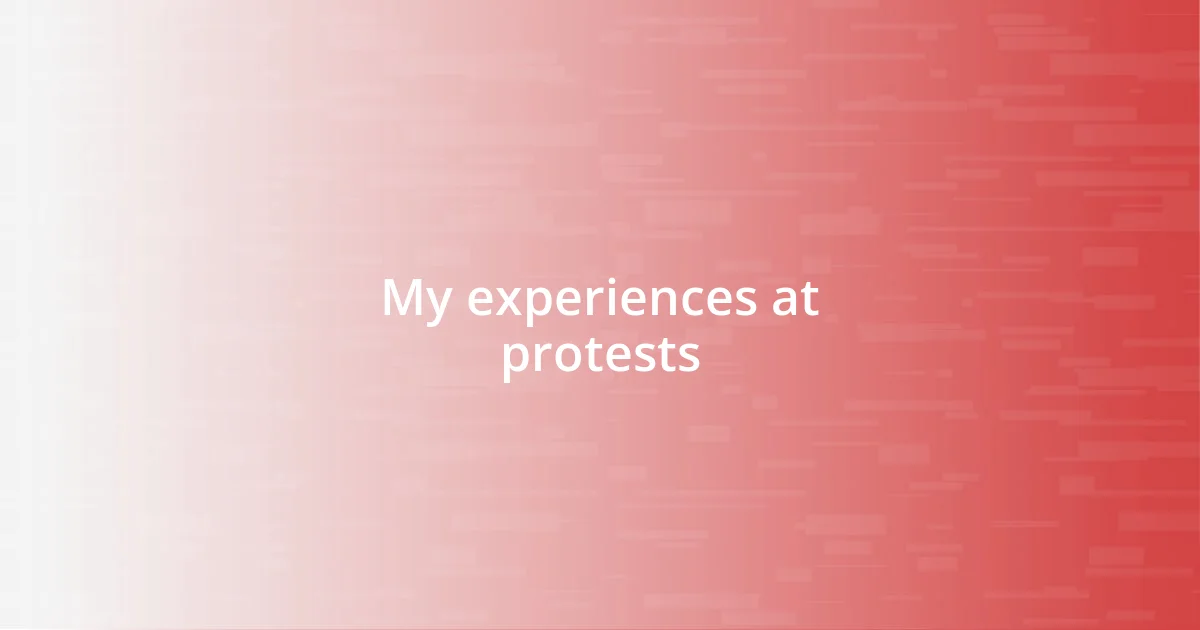
My experiences at protests
Attending my first protest was both exhilarating and intimidating. I remember standing amidst a sea of passionate voices, all united for a common cause. It struck me then: how do we find the courage to raise our voices in a world that often urges silence?
One protest I attended became a turning point for me; the energy was palpable. As our chants echoed through the streets, I felt an overwhelming sense of purpose. I often wonder, can a single moment of collective determination really spark change, or are we merely candle flames flickering in the wind?
At another rally, I witnessed a powerful moment: a young woman sharing her story about the impact of injustice on her life. Her vulnerability led to a collective gasp among the crowd, reminding me of the raw humanity behind every issue. It’s moments like these that make me reflect—what do we lose when we fail to see each other’s struggles?
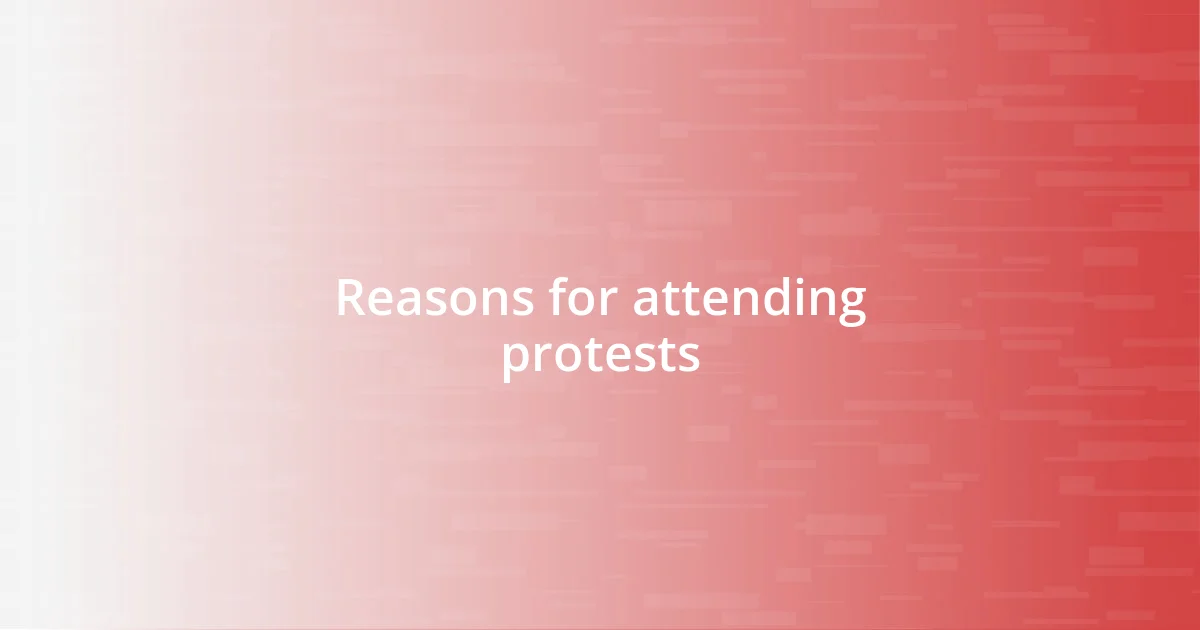
Reasons for attending protests
Attending protests often stems from a deep-seated desire for social change. Personally, when I join a demonstration, it feels like I’m claiming my voice in a larger dialogue—a necessary reminder that my opinions matter. I remember feeling this especially during a climate rally where attendees shared their hopes and fears. The collective energy was infectious, and it reinforced my belief that united action can lead to tangible change.
Another significant reason for attending protests is the sense of community they foster. At one event, I stood shoulder to shoulder with people I had never met, yet felt an undeniable bond with them. Everyone around me shared a common goal, which was both comforting and inspiring. It was a reminder that we are all part of a larger tapestry of humanity, woven together by shared values and beliefs.
Protests are also vital for raising awareness about pressing issues. I recall watching people of different ages and backgrounds come together to demand justice for marginalized communities. The stories shared that day highlighted the urgency of the cause and ignited a fire within me to take action. It made me realize that sometimes, simply showing up and listening can be a powerful form of support.
| Reason | Personal Experience |
|---|---|
| Desire for Social Change | Feeling empowered at a climate rally, witnessing shared hopes. |
| Sense of Community | Bonding with strangers over collective goals at a protest. |
| Raising Awareness | Hearing stories of marginalized voices ignited my passion to act. |
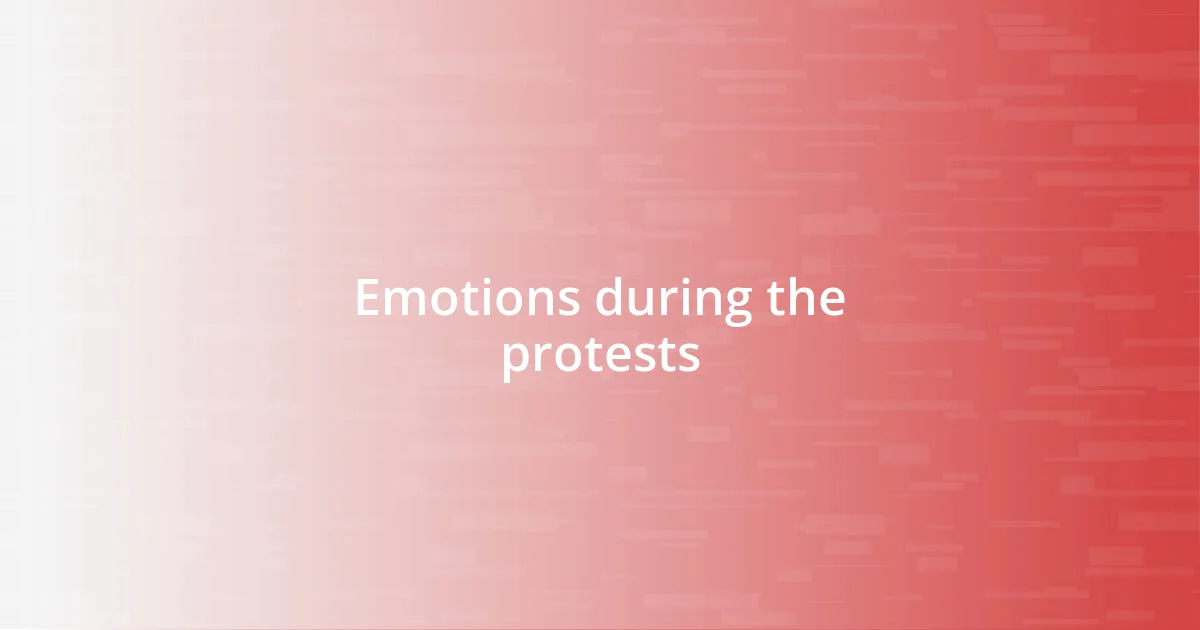
Emotions during the protests
Standing in the midst of a protest, I often find myself swept away by a tide of emotions. There’s a unique blend of hope and despair that permeates the air, making me acutely aware of the stakes at hand. I distinctly remember a protest I attended where the palpable anxiety of change seemed to hover just above the crowd. It was like a heavy blanket that reminded us of what we had to lose—but also what we could gain. In those moments, I felt both fragile and empowered, exposed yet shielded by the collective spirit around me.
Key emotions experienced during protests:
- Hope: A driving force that fuels our commitment to change, even in the face of adversity.
- Anxiety: The weight of uncertainty that accompanies efforts for social justice, often shared among participants.
- Empathy: A profound connection to the stories and struggles of others that fosters solidarity.
- Courage: The bravery that emerges when standing up for beliefs, igniting a sense of purpose.
- Frustration: The overwhelming sense that progress is often too slow, yet it motivates continued advocacy.
- Elation: Moments of joy that arise from collective victories, however small, reminding us of our shared humanity.
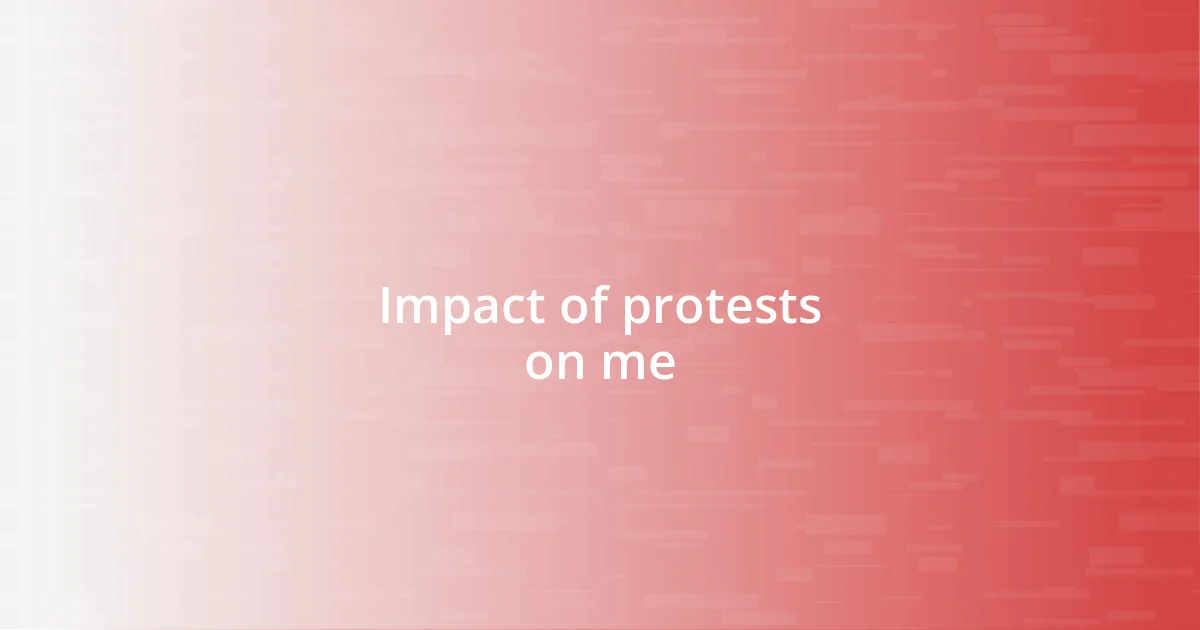
Impact of protests on me
The impact of protests on me is profound. For instance, after attending a rally for racial justice, I found myself reflecting on my own biases and privileges in ways I hadn’t before. It was eye-opening—seeing the very real consequences of systemic injustice made me question not just the world around me, but my role in it. Do you ever think about how an experience can shift your perspective so radically?
Every protest I’ve joined has left a mark on my heart. One day stands out: it was a chilly afternoon, and as we marched down the street, chanting for equality, I felt tears streaming down my face—not from sadness, but from an overwhelming sense of solidarity. It struck me how, in that moment, our voices blended together into something greater. How could a single gathering ignite such powerful emotions and connections among strangers?
Those moments linger long after the protests end. I often catch myself reminiscing about the people I met and the stories exchanged. It leaves me with a sense of responsibility to stay engaged, to continue advocating for the issues that matter. It’s a reminder that the fight for justice isn’t just a one-time event; it’s a continuous journey that shapes not only our society but also our individual journeys. Have you ever considered how such experiences can influence your life path?
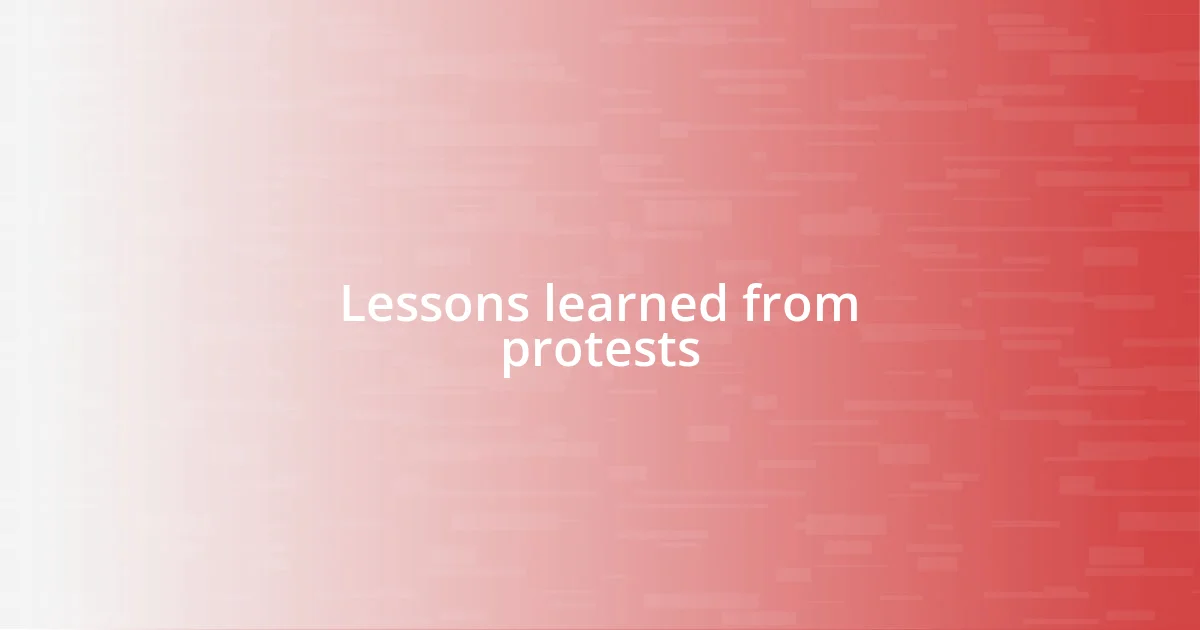
Lessons learned from protests
Every protest I’ve attended has taught me the importance of listening. I remember standing near a group of speakers at a women’s rights march. Their stories resonated deeply with me, revealing intricate layers of struggle that I had previously overlooked. It made me realize that empathy is not just about understanding; it’s about actively engaging with others’ experiences. Have you ever felt a shift in your perspective as you listened to someone share their truth?
Another lesson learned is the sheer power of unity. I vividly recall a protest where people from different backgrounds stood arm in arm, chanting for justice. It struck me how our diverse voices created a harmonious force demanding change, which reminded me of a tapestry—each thread vital to the final picture. This experience made me ponder: what if we all recognized how our unique stories contribute to a larger narrative of transformation?
Patience emerged as an unexpected insight from these gatherings. I remember being frustrated during a climate march when immediate results felt elusive. However, I soon realized that lasting change often requires time and persistence. It’s essential to appreciate the small victories along the way. Have you considered how each step, however slow, builds towards significant change in the long run?
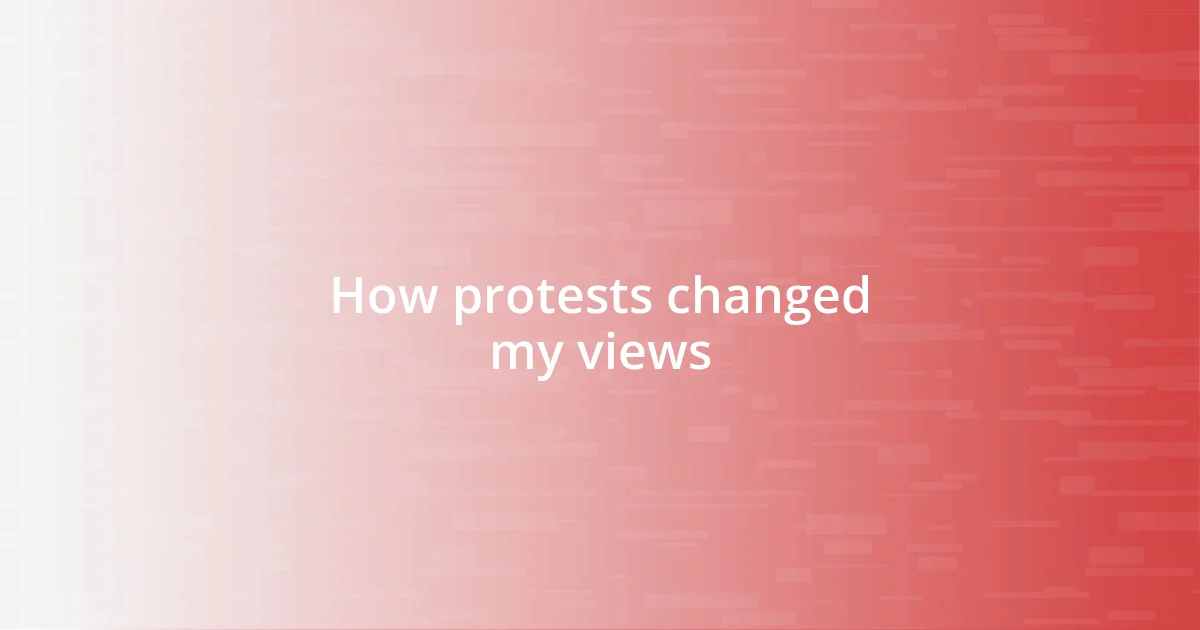
How protests changed my views
When I think about how protests have reshaped my views, one memory stands out: a night vigil for environmental justice. Surrounded by candles and quiet voices, I was struck by the shared commitment in the air. That stillness contrasted sharply with the chaos I’d often associated with activism. It made me realize that change doesn’t always have to be loud; sometimes, it’s in the soft resolve of people standing together, determined to make their voices heard.
Another pivotal moment was at a LGBTQ+ pride march. I remember feeling exhilarated, yet surprisingly vulnerable, as I listened to individuals sharing their personal journeys with courage. Their stories illuminated the complexities of identity and acceptance, reminding me that my previous understanding of these issues was surface-level at best. I found myself asking: how often do we assume we know someone’s experience without truly listening? This introspection reshaped not only my awareness but my ability to empathize with others on a much deeper level.
The cumulative impact of these events has broadened my horizons. I’ve come to understand that my perspective is just one thread in a rich tapestry of experiences. Attending protests forced me to confront my preconceived notions and engage actively with diverse voices. I would often ask myself: can we ever claim to have a complete understanding of an issue if we only remain within our echo chambers? Each protest has pushed me to step outside my comfort zone, urging me to embrace the messiness of evolving views.
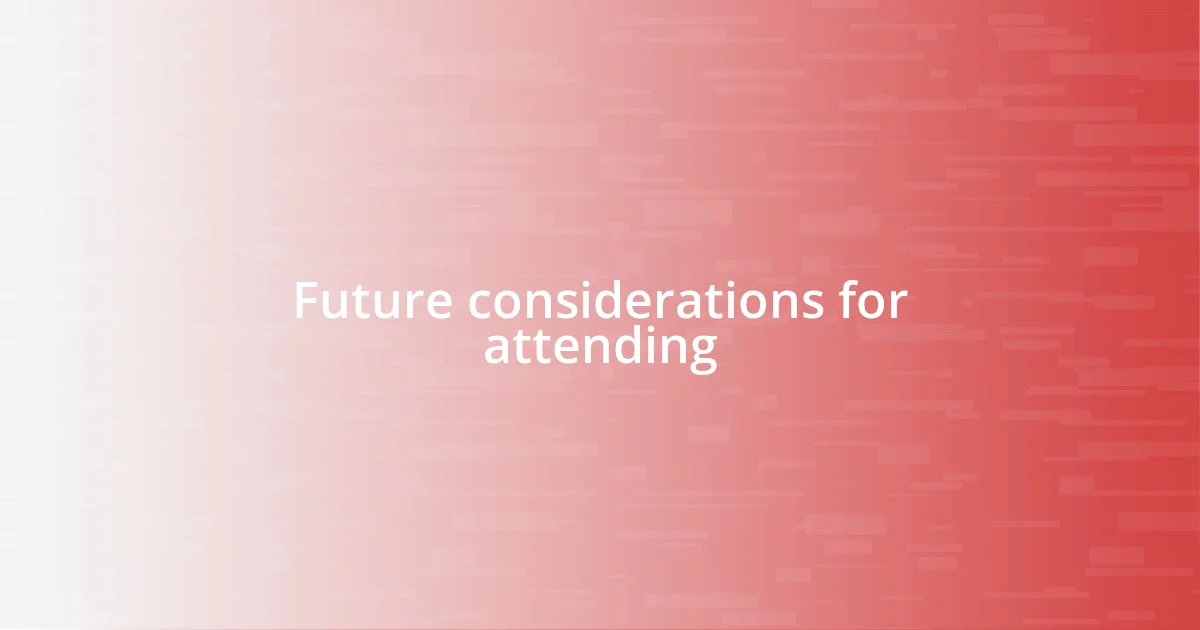
Future considerations for attending
Reflecting on the future, I often think about the significance of preparation before attending a protest. I remember a time when I hadn’t fully researched the cause I was supporting, and it felt disheartening to realize I lacked the knowledge to engage meaningfully. Now, I make it a point to read up on the issues and familiarize myself with the relevant terminology. Isn’t it more powerful to advocate from a place of understanding?
Another important factor to consider is personal safety. During a recent demonstration, the atmosphere shifted unexpectedly, prompting me to reflect on potential risks. I began to think about the essential precautions one should take—like keeping personal belongings secure or having an exit plan. Have you ever thought about how these details could make all the difference in your experience while being a part of something larger?
Lastly, the emotional toll of attending protests shouldn’t be underestimated. I once left a march feeling both inspired and drained—an emotional ebb and flow that caught me off guard. Since then, I’ve learned to create space for self-care afterward, whether through quiet reflection or a relaxing activity. How important is it for us to recharge after such intense experiences to keep the fire for activism alive?

